Hannah R. Goodman's Blog, page 2
March 11, 2024
Part 3 of 4: From Picked-on to Popular to Picked-on (again) to Invisible
Back to Picked-on
As with every ascent to the top, comes the crash to the bottom. While I never again became Pizza Hut Girl Who Humps Pillows With Vaseline in Her Head, I actually became something far worse—Fat.
Remember how I mentioned going into my closet and crying? Well, that became a coping mechanism on the regular by the end of 8th grade. By that point I was seriously dating the baddest bad boy in our class, Derrick S. We were very on brand with my middle school self—the most anti-popular power couple in the grade. He was brooding, an artist and a skater. He got into trouble often and even teachers took me aside and said this boy would be my downfall (I was a “good girl” with good grades). This relationship was exciting and sexy and scary and sad, all at once. We got together in April of the school year (though had been flirting and talking for months before) and by the summer, we had exchanged “I love yous” and I was contemplating going past second base with him.
Meantime, my other triplets had exceeded the bases with their respective serious boyfriends and I was starting to feel a strain between us. Simply put, in my mind, they were getting ahead of me and I wasn’t sure I wanted to catch up.
I coped by hiding in my closet and not only crying but binge eating, something I watched my parents do when they were stressed, and it was always followed by restrictive diets. This was normal in my house. But for me, when I started to do it, I felt terrible shame and that shame made me hide it from everyone, in my closet.
Derrick and I had to part ways for a portion of the summer while I went off to summer camp. It was a romantic goodbye of staying up all night at my house and making out, discussing our love and intensity of our feelings. Even while gone, our letters were lengthy professions of feelings: “I love you times infinity” he wrote and followed that with “I miss you so much. It’s hard to explain my feelings. I just can’t wait for you to come home.”
But other things were happening, which I would later discover when I came home…10 pounds heavier than when I left. Mind you, ten pounds that were likely related to growing and puberty more than anything else. After all, I was barely 14.
When I returned, everything was different. As we approached starting high school, Derrick pressured me to go beyond my limited second base (which I didn’t do), and my friends had started drinking and hanging out with upperclassmen. I was ill equipped for dealing with these changes.
Then—BAM!
Within the first three weeks of high school, I lost my entire friend group (including Michelle and Stacy), Derrick (boyfriend of six months at that point, which is a lifetime at fourteen), the class presidential election, and my status as the most Popular Girl in my grade. Oh, and here was the worst crime of them all: gaining more weight.
Derrick even cited that as one of the many reasons he felt we should break up. As in, “You got fat…and you won’t fuck me, so I had to fuck someone else.” Ok, I might have conflated two conversations in that last part, but these were the reasons he gave for why he dumped me.
People who once came out of the halls of sixth grade, Cluster 1, to congratulate me on overthrowing The Witch Christie P now were taunting me. There was Jimmy L, who regularly yelled down the hallway, “Hey Hannah why don’t you lose some weight?”
Ironically, said Jimmy, 3 years later, on New Years Eve 1992, would be kind enough to pick me and my date up that evening on a deserted road by the beach because I had gotten my car (actually my dad’s brand new Toyota Cressida, remember those?) stuck in the sand. Life is weird in a small town, Enemies and Antagonists can become friends so quickly. Especially if the reason they are your antagonist was because you were Fat and now you are Thin.
Side note that isn’t really an aside: Derrick was the type of boyfriend who stole a The Smiths cassette and ten dollars from me and put both in a card as my fourteenth birthday gift. He thought it was funny when I opened it and was confused, recognizing the scratches on the cassette and even the folded up ten dollar bill. He was also the kind of boyfriend who randomly punched one of those two best friends, who would eventually abandon me for unknown reasons, in the foot because it was sticking out as he walked by her. Was this an eventual factor in the rupture of our friendship? When she and I reunited around our ten year reunion, this story never came up. She, in fact, apologized to me for “not being a good friend”, so who knows!
By week four of high school, Michelle and Stacy still hated me, and the entire popular group had iced me out. To this day, the only crimes I am aware of that I did commit were getting Fat, not Hooking Up with guys, and not Drinking. Auditioning for the school play definitely didn’t help either. Though the move would prove to be a smart one ultimately, as I went on to star in many of the school plays for the rest of high school.
So back to week four of high school: Derrick asked me to “go back out with him” as the kids said in those days, and due to the winner of the class election forfeiting the title (“it was just a joke,” This Person said), I became class president. Though there was a third—recall former bully Christie P?— running as president who had come in last.
By the way, that person who forfeited was (drum roll) Derrick, who was still my boyfriend at the time he ran against me.
Take a breath and stay with me:
By week five, I was in direct conflict with all of the student council about the class float for homecoming because I had taken the advice of our class advisor to make it a Halloween/Ghost Busters theme, but no one else agreed with it. Yet, no one else had any ideas, and we were running out of time (we haven’t processed this one yet at any of the reunions, so stay tuned for that one). Then, Derrick dumped me (again). This time was public, in the hallway, via his best friend who smelled of rotting chicken soup and had flaming red hair that was in that skater hair style of hanging in an awful curtain that hid most of his face. When walked his head was held in such a way he looked like Quasimodo.By the way, the day of the dumping also happened to be our official six month anniversary (thank you to all of my diaries for the accuracy of this memory).
Said best friend, who I would later be referred to as Kevin McManiac (his name was Kevin McSomethingOrOther), approached me in the freshmen hallway on the Monday of week five. He stopped just inches from my locker and announced: “Derrick says you’re dumped.” Then threw a watch I had gifted Derrick just a few weeks before for his birthday. “And here’s your gay watch.” Then he walked away, wafting rotted chicken smell in his wake. Remember, this is the early nineties (a period in history when microaggressions were at their finest, and when gay was a substitute for lame.)
And this was only September.
Decades later, at our twenty year high school reunion when I retold this election story to a large group of former classmates, many of whom were the Popular Kids Who Iced Me Out and the rest were, as we now refer to ourselves, The Revenge of The Nerds crew. PKWIMO didn’t recalled it. However, TROTN crew did recall it with great empathy (no surprise!).
By the way, Bad Boyfriend Derrick, never showed up at any of these reunions. However, he sent me a weird and kind of flirty DM on Facebook in 2012 and acted as if we were old pals.
We were not, and we will never be.
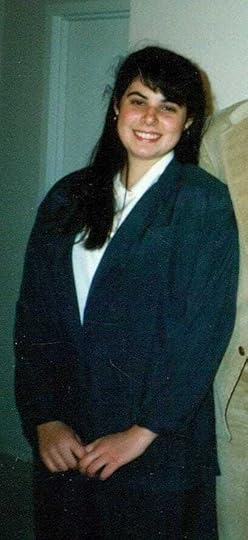
The epitome of not cool. 9th grade. April 1990
By October of freshman year, I was completely iced out of The Popular Group that I had been so intertwined with for four years, which is a lifetime—roughly a fourth of my life so far!
The only people who talked to me at this point were the upperclassmen from theater and the private school kids who never knew me from my—so-called—skinny, popular years.
By November, I was in tech week for the production of Born Yesterday, my first high school theater performance. The only freshmen in the cast, I was a manicurist with the simple line of “Yes, sir!” while pretending to file senior Tony H.’s nails. Tony H. was a sweetheart but, man, could he belt out his character Harry Brock’s sexist lines to “dumb blond Billie” played by Tony’s actual girlfriend. Fun fact: They would go on to get married and have two kids.
Anyway, while on stage during tech week, unbeknownst to me, the lighting guy, a junior named Nate, had a crush on me and would later tell me he had intentionally shined the spotlight directly on me during my one and only scene. By mid-week, he commissioned his “friend”, a girl named Amy, who was the stage manager to tell me that he wanted to take me on a date. Though the hairs on the back of my neck prickled from the similarity that this echoed of the love triangles of yesteryear a la Christie P./ Matt B./ Pat S., I ignored the creepy foreshadowing.
I shouldn’t have.
It turned into a bigger mess than my middle school drama ever could have been!
Nate and I went out on some dates, which initially impressed me (and my mother!). Most memorable was the dinner at a local pub in Newport followed by a performance of Othello at Newport Play House. The performance was unremarkable in my memory but what does stand out is that when Nate came to the house to retrieve me for this date. My mother invited him inside only to tell him about her performance as a tap dancing sailor in The Newport Play House’s 1974 production of Anything Goes. “I was eight months pregnant with Hannie!” She told him, using the awful nickname my family insisted suited me (it does not!). Mom then proceeded to stand up right in front of where Nate sat awkwardly on our couch, which was overly stuffed with too many decorative pillows, and demonstrate how she could still Shuffle Off to Buffalo.
And he still asked me out again after that.
But alas, I was still hung up on ole Derrick. Yeah, remember him? I was still clinging to hope via his post-break up, vulgar, prank phone calls that were nightly at this point. “Whore! Slut! Bitch” he would yell when I would finally pick up the phone. The many benefits of having my own phone line—easily accessible to asshole ex-boyfriends.
Anyway, Nate was sweet, but I was still in love with my captor, so-to-speak or, as we say in my biz, “abuser”. Not only that, Nate seemed so old, so adult as a junior to my 9th grade self. So when he drove me out to Purgatory Chasm to give me what would become the best mixtape I ever received (Depeche Mode’s Somebody?! The Cure’s Boys Don’t Cry!?) and asked me to be his girlfriend, I had to end it.
The very next day Amy (now the hair on the back of my neck really stood up!) accosted me in school at my locker. “What kind of slut are you? Did you know you gave him his first kiss? Then, you dump him?” She snarled, her cheeks inflamed with red splotches. She screamed at me that I deserved to be punched in the face and that she would gladly be the one to do it.
Though she did not punch me in the face, she spent the rest of the week giving me nasty letters about my slutty ways. She called me a “tease” as I passed her in the hallway. Meanwhile, Nate simply ignored me. The show was over by this point, so we didn’t have to see each other any more.
In an abrupt turn of events Nate started to hang out with another girl who was in his grade, and they started to date. Amy, in my memory, vanished. I don’t know how her harassment of me ended. But before Christmas break, it was over.
My theater career took off after this and sophomore year, Nate and I played husband and wife in our production of 12th Night.
And, I went on to briefly date his younger brother my junior year!
At this point, overt bullying basically ended, but what happened next, in some ways, was a lot worse.
Read Part 4: Invisible

Disclaimer: This is a several-part piece that talks about my most painful experiences in my childhood and teens years with bullying. In order to (emotionally) feel safe sharing these stories, some names have been changed as well as minor details. As a woman in my late forties, who has battled (for decades)—as many women do—with myself over whether or not I have the right or deserve to speak my personal truth and perspective on events that happened to me, I’ve decided to not allow that inner battle or my fears to stop me. Who knows if anyone will read this. Who knows if anyone who reads this will be someone from my past who participated, witnessed or knew about these events. And, who knows if anyone will care. I do know that someone out there will relate. That my story will connect with someone. So here are my true stories of bullying and the effects they had on me.
Epilogue: The Problem with Peaking in Middle School and other stories of bullying
High School Reunions
“Hannah Goodman! You slammed the door in my face when I came to one of your parties in 8th grade!”
It’s my 20th high school reunion. Summer 2013. We are at the beach, a bonfire. It’s dark and hot. But I can see him well enough—He is a short, blondish haired middle aged version of a kid I vaguely remember from high school—Willy something. I rack my brain trying to remember doing such a thing. Nope. Can’t find that memory in there.
He can tell I don’t remember, and he laughs, sipping his beer while I, red with embarrassment, begin to apologize. He waves it off. He wants to tell me about his daughter who is a writer. But I am in and out of the moment, still racking my mind with the memory…nothing. Oh, shit. There Willy is now asking me if I would talk to his daughter about writing because I know you wrote some books he tells me. None of which feature a protagonist who's such a bitch that she would slam the door on a classmate trying to come to her party— thank god! But wait—was I a dick in 8th grade? It’s possible. The joke I tell my own children is I peaked in 8th grade, and it was downhill from there. Also, is it really a good idea to read his kid’s stories?
FUCK!
Later, on the car ride home with my husband, we review the evening, and that’s when I clearly remember. I might have been a dick in 8th grade—sort of. Popularity—my boyfriend: the baddest and coolest boy in school. My best friends: the funniest, smartest blonds who everyone liked. It was a good year…sort of.
I really wanted to turn the car around and tell Willy, Yes I remember! But hey Willy, there is so much more to this story. That moment that I slammed the door in your face was about my stupid insecurity. About staying “cool”. Sweet Willy, you weren’t cool. You were what we called a “poser” or a “wannabe”. Listen, Willy, my story wasn’t that I was always cool. There was the bullying that bookended all of my school years. Elementary (for not being dorky and new to the school) and high school (for getting Fat freshman year). It was only middle school, by luck and chance and a little desperation that I was cool. But, Willy, listen I really was a closeted, not-cool nerd.
We didn’t turn the car around. But Willy and I became Facebook friends.
10 years later, summer 2023, it’s my 30 year reunion and a popular cheerleader type, now middle-aged mom like so many of us, comes over to me and she says, a little drunkenly (we all got more shit faced that night than I ever did in high school) and she says, “Hannah Goodman. You were …something in high school, right? You were class president or something?”
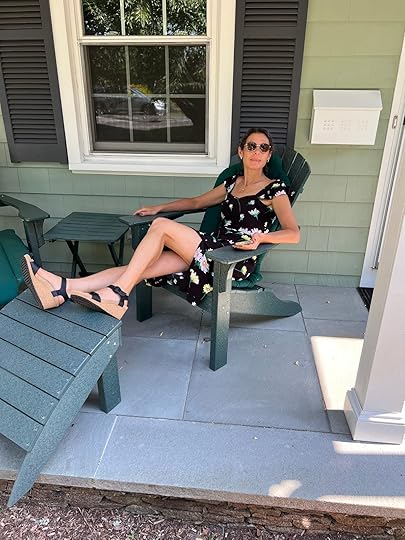
Just about to go to the 30 year reunion! July 2023
Ah! Yes dear Jessica (there were so many Jessicas in the class of ‘93) this one was a nice one. Actually all of the Jessicas were nice. So, I tell her that yes, I was something. I was freshman class president and then …Pat (also a lot of Pats from ‘93) appears and finishes the story by proclaiming, as he has for the past three reunions, “Then she went to France.” Which always cracks him up and, truthfully, makes me laugh too.
But I didn’t go to France. This is an old joke from the 10 year reunion, where 6 months pregnant with my first child, I stood next to one of my former bullies from middle school (yes, there was a brief bullying moment there, but it doesn’t sting as much because I won). Christie P was beaming at me while rubbing my pregnant belly and saying “Oh my god! You barely look pregnant!” And then Pat came sweeping in, “Hannah Goodman! You’re finally back from France.” I looked at him with total bewilderment. I mean, I was still reeling from Christie’s hand on my belly, from her totally insulting comment about my belly’s size. I was, after all, seven months pregnant! Pat goes on, “Yeah, you disappeared after freshman year, and I seriously thought you went away until senior year.”
Ah—senior year, when I was skinny and, therefore, “hot” (and riddled with an eating disorder) and, therefore, visible again to the popular crowd. Ok, to be fair, that’s my interpretation, which could very well be wrong. I laughed along with Pat and Christie, who nodded her head in agreement. “So, where did you go, Hannah, between freshman year and senior year?”
Do you want the short or long answer to that? I disappeared into not one but two eating disorders and, in so doing, discovered my true, introverted self. I gravitated away from my former Blonde best friends and the rest of the popular crowd I had been with throughout middle school.
10 years after Christie put her surprisingly warm hand on my barely-there belly, we are at the 20 year reunion, and this time Christie, who appeared to be tipsy but not in a fun way, approached me, and pointed a finger. “You never invited me to your parties in 8th grade!”
At the time, it feels like Willy all over again (which, if you can keep up, was just the night before at the bonfire). But this time, my memory— as it is with all of my former bullies from childhood—is crystal clear.
“I didn’t invite you because we weren’t friends, Christie. You were horrible to me! That’s why I didn’t invite you.”
She continued to repeat how I didn’t invite her and how much she felt left out. I shook my head and just walked away.
Didn’t see her for the rest of the night or for the beach day the next morning.
But we became Facebook friends.
Life is weird.
Be sure that you have read the first 4 parts! Start with Part 1. Disclaimer: This is a several-part piece that talks about my most painful experiences in my childhood and teens years with bullying. In order to (emotionally) feel safe sharing these stories, some names have been changed as well as minor details. As a woman in my late forties, who has battled (for decades)—as many women do—with myself over whether or not I have the right or deserve to speak my personal truth and perspective on events that happened to me, I’ve decided to not allow that inner battle or my fears to stop me. Who knows if anyone will read this. Who knows if anyone who reads this will be someone from my past who participated, witnessed or knew about these events. And, who knows if anyone will care. I do know that someone out there will relate. That my story will connect with someone. So here are my true stories of bullying and the effects they had on me.
Epilogue: From Picked-on to Popular to Picked-on (again) to Invisible
High School Reunions
“Hannah Goodman! You slammed the door in my face when I came to one of your parties in 8th grade!”
It’s my 20th high school reunion. Summer 2013. We are at the beach, a bonfire. It’s dark and hot. But I can see him well enough—He is a short, blondish haired middle aged version of a kid I vaguely remember from high school—Willy something. I rack my brain trying to remember doing such a thing. Nope. Can’t find that memory in there.
He can tell I don’t remember, and he laughs, sipping his beer while I, red with embarrassment, begin to apologize. He waves it off. He wants to tell me about his daughter who is a writer. But I am in and out of the moment, still racking my mind with the memory…nothing. Oh, shit. There Willy is now asking me if I would talk to his daughter about writing because I know you wrote some books he tells me. None of which feature a protagonist who's such a bitch that she would slam the door on a classmate trying to come to her party— thank god! But wait—was I a dick in 8th grade? It’s possible. The joke I tell my own children is I peaked in 8th grade, and it was downhill from there. Also, is it really a good idea to read his kid’s stories?
FUCK!
Later, on the car ride home with my husband, we review the evening, and that’s when I clearly remember. I might have been a dick in 8th grade—sort of. Popularity—my boyfriend: the baddest and coolest boy in school. My best friends: the funniest, smartest blonds who everyone liked. It was a good year…sort of.
I really wanted to turn the car around and tell Willy, Yes I remember! But hey Willy, there is so much more to this story. That moment that I slammed the door in your face was about my stupid insecurity. About staying “cool”. Sweet Willy, you weren’t cool. You were what we called a “poser” or a “wannabe”. Listen, Willy, my story wasn’t that I was always cool. There was the bullying that bookended all of my school years. Elementary (for not being dorky and new to the school) and high school (for getting Fat freshman year). It was only middle school, by luck and chance and a little desperation that I was cool. But, Willy, listen I really was a closeted, not-cool nerd.
We didn’t turn the car around. But Willy and I became Facebook friends.
10 years later, summer 2023, it’s my 30 year reunion and a popular cheerleader type, now middle-aged mom like so many of us, comes over to me and she says, a little drunkenly (we all got more shit faced that night than I ever did in high school) and she says, “Hannah Goodman. You were …something in high school, right? You were class president or something?”

Just about to go to the 30 year reunion! July 2023
Ah! Yes dear Jessica (there were so many Jessicas in the class of ‘93) this one was a nice one. Actually all of the Jessicas were nice. So, I tell her that yes, I was something. I was freshman class president and then …Pat (also a lot of Pats from ‘93) appears and finishes the story by proclaiming, as he has for the past three reunions, “Then she went to France.” Which always cracks him up and, truthfully, makes me laugh too.
But I didn’t go to France. This is an old joke from the 10 year reunion, where 6 months pregnant with my first child, I stood next to one of my former bullies from middle school (yes, there was a brief bullying moment there, but it doesn’t sting as much because I won). Christie P was beaming at me while rubbing my pregnant belly and saying “Oh my god! You barely look pregnant!” And then Pat came sweeping in, “Hannah Goodman! You’re finally back from France.” I looked at him with total bewilderment. I mean, I was still reeling from Christie’s hand on my belly, from her totally insulting comment about my belly’s size. I was, after all, seven months pregnant! Pat goes on, “Yeah, you disappeared after freshman year, and I seriously thought you went away until senior year.”
Ah—senior year, when I was skinny and, therefore, “hot” (and riddled with an eating disorder) and, therefore, visible again to the popular crowd. Ok, to be fair, that’s my interpretation, which could very well be wrong. I laughed along with Pat and Christie, who nodded her head in agreement. “So, where did you go, Hannah, between freshman year and senior year?”
Do you want the short or long answer to that? I disappeared into not one but two eating disorders and, in so doing, discovered my true, introverted self. I gravitated away from my former Blonde best friends and the rest of the popular crowd I had been with throughout middle school.
10 years after Christie put her surprisingly warm hand on my barely-there belly, we are at the 20 year reunion, and this time Christie, who appeared to be tipsy but not in a fun way, approached me, and pointed a finger. “You never invited me to your parties in 8th grade!”
At the time, it feels like Willy all over again (which, if you can keep up, was just the night before at the bonfire). But this time, my memory— as it is with all of my former bullies from childhood—is crystal clear.
“I didn’t invite you because we weren’t friends, Christie. You were horrible to me! That’s why I didn’t invite you.”
She continued to repeat how I didn’t invite her and how much she felt left out. I shook my head and just walked away.
Didn’t see her for the rest of the night or for the beach day the next morning.
But we became Facebook friends.
Life is weird.
Be sure that you have read the first 4 parts! Start with Part 1. Disclaimer: This is a several-part piece that talks about my most painful experiences in my childhood and teens years with bullying. In order to (emotionally) feel safe sharing these stories, some names have been changed as well as minor details. As a woman in my late forties, who has battled (for decades)—as many women do—with myself over whether or not I have the right or deserve to speak my personal truth and perspective on events that happened to me, I’ve decided to not allow that inner battle or my fears to stop me. Who knows if anyone will read this. Who knows if anyone who reads this will be someone from my past who participated, witnessed or knew about these events. And, who knows if anyone will care. I do know that someone out there will relate. That my story will connect with someone. So here are my true stories of bullying and the effects they had on me.
March 17, 2020
Reflection on: Friendship over Forty
In early 2014, I had a pretty bad battle with depression and anxiety—kind of an early-ish, midlife crisis. It took a year of intense therapy and excellent self-care to feel like myself again. Then, early 2016, during a routine colonoscopy (I started getting them in my late twenties because of family history), my gastroenterologist found a large tumor that had to be removed with abdominal surgery.
During that two-year period of being sick (first mentally and then physically), I was forced to (re)examine my life. I had to determine what would help me recover and stay well and what wouldn’t. What I discovered is that I had some friends in my life who weren’t helping me heal. In fact, they were draining my energy. When you are not well yourself, it’s very hard to tolerate those types of relationships. So, I started to say "no" more and more to those people. Eventually, over a long period of time, they faded from my life.
There were moments before I completely cut them out that I wanted to tell them how I felt, and I sat with those moments, really wondering what would be the reason for telling them my feelings. Guilt was the only motivation. There are a lot of emotions and feelings that may motivate friendships, but guilt shouldn’t be at the top of that list. I knew then that it would be crueler to offer them reasons or explanations because the implication of that is that I would want to save the friendship, and I knew that I didn’t.
In doing this, I found myself with a handful of people who I really enjoyed. I felt content and happy with that part of my life for many years. And then, a few years ago…two of them shut me out. No official goodbye. They just stopped messaging me and making plans. I did ask them each if I had done something to make them upset and both said no.
With those two people, initially, when I realized that they were ghosting me, I was hurt. Over time, I began to realize that if they didn’t want to tell me why they no longer wanted to be friends, and I did ask, what more could I do?
Younger me would have obsessed over that and wrote long letters/emails of apology, even if I didn’t know what I did. When relationships ended, I always assigned the fault and blame to myself.
***
When I was in middle school and high school and would have some kind of girl-fight-drama, my mother always took the opposing team’s side. “Oh, so-and-so has such a tough home life you know…Well, so-and-so just says that to you because she’s jealous…Well, maybe you said something that upset so-and-so…” These were most of the types of responses I would get when I would complain that someone wasn’t being nice to me or leaving me out. Over time, the message I got was, whatever happens, it’s my fault and/or I should tolerate it because so-and-so has it worse than I do.
I also got the message from my older sister, too, that if my friendships weren’t good, it was my fault. I remember when I was a freshman in high school, after going through a really big break up with my first real boyfriend and gaining a lot of weight, my big group of friends iced me out. “You need to lose weight and get your friends back.” Is what my sister told me. Then she added that she thought I had pushed my friends away, not the other way around.
Let me say this, my sister wasn’t entirely wrong. At all. But that’s not the point. The point is that as MY sister, I wanted her validation and love. I wanted her to help me figure out on my own what to do. The way she jumped right into problem-solving mode was definitely well-intended, but it missed the mark and unfortunately sent me the message that my hurt, my pain, what I felt my friends had done to me to cause me to move away (and get fat) didn’t matter.
The message I got is that if someone isn’t treating me kindly if someone is excluding me or rejecting me, I’m the reason why, me and it’s up to me to change and adjust so that I can gain that person’s affection back.
***After years of being in therapy and then becoming a counselor, I understand that mothers/fathers and big sisters/brothers often take the other person’s side, so-to-speak. In many cases, they do it because they think they are shielding you from hurt, shame, or embarrassment. To them, they are protecting you because they love you. In the short term, immediately taking responsibility for the demise of a friendship, immediately apologizing or accepting blame, will probably get you back in the good graces of the friend who shut you out, but in the long term the message you are sending yourself is that your voice, your feelings, your hurt matters less, if at all, and it is this message that can lead to depression and anxiety over time.
What would have happened if my mom had said to me, “Wow, that sucks. How do you feel? What’s going on for you with this?” And then what if she stepped back and let me work through the whole thing on my own, make my own mistakes and call my own shots based on myself and who I am. Maybe, just maybe, I was someone who didn’t want to go along with the crowd and tolerate the kind of peer pressure and judgment that those groups of friends operated under (they were the drinking/popular crowd). Maybe I would have rather be alone than be with people I no longer felt connected to. Imagine if I was empowered to be able to listen to my own instincts and my own inner voice that was telling me it’s time to move on from those people…so you can find new people who match more with who you are now.
The transition from middle to high school was hard for me because the crowd I ran with began to do things in high school I wasn’t ready to do. I felt like we no longer had anything in common. I was going through my own hard time with an eating disorder and a bad experience with a boy and what I needed my old friends couldn’t give and, frankly, didn’t want to. Looking back, I get it and I get why they essentially pushed me out and it’s okay…but back then, it wasn’t okay for my mom or sister to point the finger of blame back at me. They couldn’t tolerate my sadness and pain at the breakup of the friendships, and so instead of supporting me as I grieved and moved forward from it, they tried to make me stay.
And because I trusted my big sister and my mom, I felt wrong and guilty that I couldn’t “lose weight and make up with my friends” as my sister put it. I felt shame that the truth was I was glad my friendships with them were over because I’d outgrown them and they had outgrown me. If I had just grieved and went through that part, high school would have been less of a struggle. Instead, I battled my inner voice against the voices of my mom and sister—both of whom I really trusted.
As I got older and moved away from listening to them and more to me, I realized that instead of, as my sister once put it, "cycling through friends", what I was doing was allowing friendships that were no longer working to fade away. Friendships I made in college lasted a long time while we were all facing similar life stages and then when my life went in a different direction, those friendships faded out. I mean I stayed close with most of them for 10 plus years. Friendships I made through my first and second jobs, those were situational and as I got married and had children, again my life changed and so did those friendships.
Now I have had the same one best friend since we met when our oldest children were less than two-years-old (14 years ago). This is an unwavering friendship that is rare because we’ve grown and changed individually but none of that has been problematic in our friendship. While my closest friendships are less than I can count on one hand, people I talk to and socialize with regularly, I do have a network of what I call mom-friends. These are people I know through my children, and while I do enjoy their company, due to time and circumstance, I don't socialize with them outside of kid-related activities. I have the dance-moms and then the school-moms...we all can relate, at the very least, through the trials and tribulations of what are kids are all going through. We may not see each other all the time, but we've known each other for years and can connect immediately over dance recital rehearsal weekends, band concerts, or just the few minutes when we drop our kids off at each other's respective homes for hangouts.
The benefit of being this age is that I realize that we really only need a few close friends. Having one or two best friends, I can give to them the way I want to—if one bestie needs me to pick her kid up from school or the other is having a work-related crisis and needs an ear, I'm right there. If I had a large group of friends, I wouldn't even have time to devote to them and that would cause me a lot of grief. Not only that, I’m a person who likes depth in a close relationship. If it’s not real and authentic, if we can’t have reciprocal vulnerability, then we aren’t a match. If you need me to call and text you several times a day, we shouldn’t be friends. If you want to do a “girls’ night” with fifty other women, I’ll have to pass. But, if your idea of the perfect friend-date is to meet at a coffee shop and talk about our lives, I’m your girl.
***Recently, both of the women who ghosted me a few years ago re-emerged—one sent me a text and the other I ran into when I was out and about in town. Both acted like there hadn't been a long period of ghosting but neither really made an effort to re-establish anything. While this would have reopened wounds if I were younger, instead it simply reaffirmed to me that it is truly best to let friendships fade when they no longer seem to be working. As the saying goes: "people come into your life for a reason, a season, or lifetime".
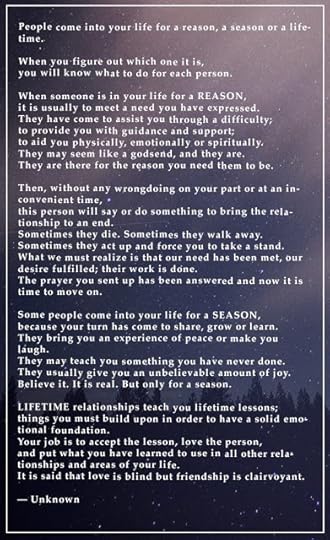
November 8, 2019
Day 8: NaNoWriMo 19
Day 8 of NaNo WriMo
I set out this NaNoWriMo with the intention of trying something totally new—working off of an outline. So back in September I spent a month using The Snowflake Method, which helps writers to organize every aspect of their novel, especially character and scene development and plot structure. I actually enjoyed this more linear process of writing and felt like it would make writing this very different and very complicated novel easier (it involves time travel—way outside my writing comfort zone!).
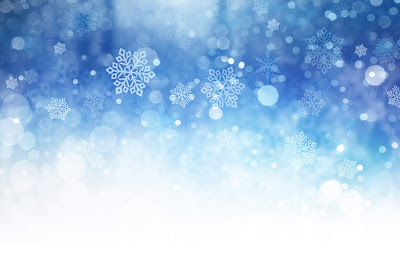
I was TOTALLY wrong about this making writing a novel easier.
I’m a “pantser” by nature, so NaNoWriMo has always been my jam, since the rules and goals are totally in line with the “panster” approach: Sit your pants down in your chair and write and write until you reach 50k.
But...the problem I have been having over the last few NaNos is that I have this mess of a manuscript that requires at least a year's worth of editing. The idea of not having such a tangle of words this time was very appealing.
So, I thought that I could go against my natural inclination and attack this project with a blueprint in hand.
However, instead of making the process easier, it’s made me stay way in my head and agonize over each and every detail. Am I following the plot outline? Am I using all those details I wrote in the character inventory? It also interrupts my natural inclination to improv as I write, meaning throw in and develop details about my characters and their lives in the moment that I am writing their scenes. I just can't do that when working off of an outline.
So today as I was working slowly and painfully through a particular scene (and bored to death from agonizing over details in my outline) I decided that I wasn’t going to obsess over those things and that I would loosely follow the outline (at least plot-wise) and that the goal needed to get the words on the page, even if they are shitty words….and this led me to actually rethink my whole goal, which was to write a much neater draft than I normally do.
Instead, I’m going to set the goal of write shitty but write a lot and write fast—fix later. Who cares if it takes me a year to clean up the book? It's not like I'm on a hard and fast deadline.
Forget any level of perfection or even good…I’m settling for done. I’m settling for words on page, all of them.
Happy writing everyone!
November 1, 2019
Diary of a NaNo-er: Day 1
It's Day 1 of NaNoWriMo, something I've successfully participated in 4 other times. What does "successfully complete" mean in the world of NaNo? It means finish 50,000 words Yep. That's it. Not edit. Not even write the whole thing. Just 50k—getter done!
This approach has never been a chore for me. I'm a "pantser" by nature (definition: one who goes by the seat of one's pants when writing, ie. doesn't plan), so this has always been fun for me. But what it hasn't been is...well...successful. Here's what I mean by that: Yes, I can finish 50k words. Not a problem. BUT those manuscripts from the 4 other times of NaNo-ing are still sitting unfinished (except for one, which is totally done and at one time was in the hands of well-known editors for consideration but that didn't work out so it is sitting in the proverbial drawer waiting for me to resurrect it again). It all boils down to this: I want to try a new approach to this whole process.
I'm also going to keep a diary of the experience this time. Another thing I notice is that NaNo is always this crazy blur, and I really want to be present to the experience. This goes back to my days as an MFA student, where I wasn't always in such a rush to get a certain number of words. I was far more deliberate with my writing. I miss that.
So, today, Day 1, I’m at the library because my original plan—what do they say about making those?—was foiled, so instead of going up finally to What Cheer Press and use their shared worked space like I thought a real writer would do for the first day of NaNo, I am here at the library, and, well, this isn’t ideal. I am in a cubical with the sunlight pouring in (not a bad thing), but it’s very noisy because it appears that someone is helping another individual VERY loudly, and also I am way too close to the check-out desk where the idea of quiet seems to have eluded them all…
 Title page of my WIP for NaNo
Title page of my WIP for NaNoIt’s 12:07 and I am not spending a lot of time on this diary entry. The point of it is to keep me accountable during this month. I don’t have the hard and fast goals that I have had in the past, the same ones you all have, the whole premise of NaNo—to complete an entire draft in that messy and pantser-y way. Not this time. I want to go slow and steady and try something different: my goal is simply to get a few chapters out of this new novel…chapters that I feel good about, which means edit as I go. Since all I ever do in my approach is pants my way through things, I need to change it up.
In all the years I’ve been a writer of novels that’s how each one was approached, and since I’m not exactly on the best sellers list (yet?), I figured I’d try the opposite (it’s kind of what they say in this mode of therapy called DBT, do the opposite as in if what you have been doing isn’t making things better, let’s try the opposite, as in the thing most likely that you are afraid to do because you are afraid you will fail.
So…
No pantsing this time. In fact, I spent all of September using the snowflake method to prep for this NaNo. I’ve never in my life outlined an entire novel BEFORE even writing the opening scene.
It’s 12:10. So I am stopping this diary entry now. I’ll publish this later and add to it how much I actually got done, and since I basically only have until 1:30, I better get going! Or as I tell my husband, I better get fishing…that’s what we are calling my writing time this month—going fishing—because that’s what he does with whatever free time he can carve out, and in case you don’t know, it’s been fishing season since June. Now that it’s November, it’s MY fishing season.
Goin’ fishing!
It’s now 3:10. I managed to get 2000 not terrible words in. This is a shock to me. I edited as I went—not obsessively—and I didn’t write in that frantic way I typically do for NaNo. I feel good!
Let’s see what tomorrow brings! Hopefully, a lot of fish!
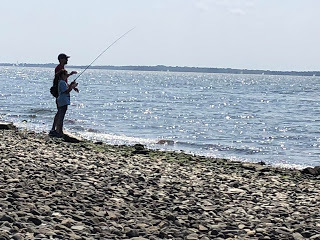
October 29, 2019
9 Questions With...Hannah R. Goodman
 Welcome to season two of 9 Questions With... where the questions are a little sassier and a bit more irreverent. To kick off this round of interviews, I begin with ME! If you find yourself wanting to participate after reading my raw and real responses, please click on this link to the interview form and follow the instructions CAREFULLY. I am a stickler for following instructions (though I have trouble doing so myself!). So, read on and feel free to comment below!
Welcome to season two of 9 Questions With... where the questions are a little sassier and a bit more irreverent. To kick off this round of interviews, I begin with ME! If you find yourself wanting to participate after reading my raw and real responses, please click on this link to the interview form and follow the instructions CAREFULLY. I am a stickler for following instructions (though I have trouble doing so myself!). So, read on and feel free to comment below!Today on 9 Questions With...Hannah R. Goodman YA author of The Maddie Chronicles and its sequel Till It Stops Beating.
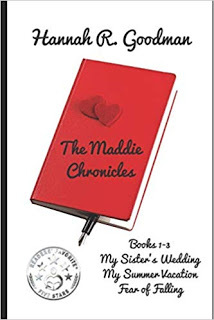
The Maddie ChroniclesBy Hannah R. Goodman
1. Give us a tweet-sized pitch of your latest book.
The Maddie Chronicles: A young woman's journey through high school where she experiences love, loss, and addiction...all wrapped up in painfully hilarious story-telling. (Ok, so tweeting is not my forte!)
2. Why did you write this book?
I wrote each of these stories as a way to recover from the agony of high school and also as a way to reach out to teens today who are in a similar agony.
3. What has been the hardest part of the publishing process?
Understanding that talent, an agent (or two), an MFA, winning awards and accolades for your writing, and hard work are not necessarily enough to get you into the door of the Big 5 publishers. After 20 years, I still cannot figure out what that "special something" is that not only opens those doors but escorts you through!
ALSO, author events can be humiliating and yet sometimes the opposite—sometimes they can be so lovely and fun. (Try not to take any of this personally...easier said than done!)
4. What has been the biggest (pleasant) surprise in your publishing journey?
The camaraderie among us self and/or indie pubbed folks has been so lovely and inspiring to me.
5. As an indie author, which is better: self-publish, small press publish, or both? Expand on your answer.
I think always start out by submitting to agents and the Big 5 because you never know. However, don't spend decades doing this because before you know it, you will be tired and, quite frankly, bitter. That being said, I say, give that a go first because it COULD work! If it doesn't and you are PASSIONATE about your writing (not about making money and/or seeking fame) then do some research on self-publishing and small press publishing. Whichever way you choose, have your eyes WIDE OPEN to the reality that you most likely will not make money off of this venture. Understand that you have to approach this as a passion project. This will reduce the stress and (unrealistic) expectations lots of authors put on themselves, stress and expectation that shrinks their (already fragile) self-esteem to just a shriveled, pile of nothingness. If you lower the expectations and focus on creating a beautiful book, whatever comes after that will feel like gold. This is my opinion based on my almost 20 years in the publishing world. Other folks have drastically different and very opposite opinions. You can listen to all of us, but at the end of the day, listen to yourself and evaluate your own situation.
6. What’s the worst advice you have ever received about publishing?
"Don't self-publish." DISAGREE! Self-publishing has been cathartic and liberating. Plus it got me a lot of press back in the day, including being featured in Publishers Weekly, and it brought me to both of my agents. #writergoals
7. What author or book has influenced your writing?
Judy Blume is my jam all the way!
8. What is your philosophy about rejection?
Each no brings you closer to a yes...also I'm not for everyone and everyone is not for me.
9. Tell us the brutally honest truth about being an indie (self-published/small press published/unfamous) author. (Please don’t be offended by my irreverence).
Three truths and one lie: 1. The money, time, and energy will never be reflected in your profits. 2. Booksellers don't really love consignment but the nice ones tolerate it. 3. Going the small press route is very similar to self-publishing but the support aspect of it so very much worth it. 4. Non-indie or non-self-published authors totally understand our plight. (Can you figure out the lie?)
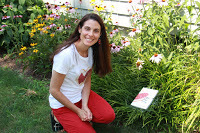 Twitter: @hannahrgoodmanFacebook: https://www.facebook.com/tillitstopsbeatingnovel/Instagram: https://www.instagram.com/tillitstopsbeating/Linkedin: https://www.linkedin.com/in/hannah-goodman-76b9596/Amazon Author Central: https://www.amazon.com/Hannah-R.-Good... https://www.hannahrgoodman.comEmail: hrgwriterwoman@gmail.comGoodreads: https://www.goodreads.com/author/show/969127.Hannah_R_GoodmanBookBub https://www.bookbub.com/authors/hannah-r-goodman
Twitter: @hannahrgoodmanFacebook: https://www.facebook.com/tillitstopsbeatingnovel/Instagram: https://www.instagram.com/tillitstopsbeating/Linkedin: https://www.linkedin.com/in/hannah-goodman-76b9596/Amazon Author Central: https://www.amazon.com/Hannah-R.-Good... https://www.hannahrgoodman.comEmail: hrgwriterwoman@gmail.comGoodreads: https://www.goodreads.com/author/show/969127.Hannah_R_GoodmanBookBub https://www.bookbub.com/authors/hannah-r-goodman
August 9, 2019
9 Questions With...Hannah R. Goodman
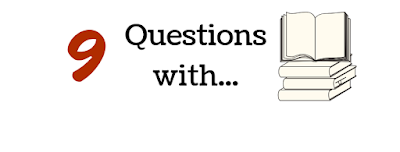
Welcome to season two of 9 Questions With... where the questions are a little sassier and a bit more irreverent. To kick off this round of interviews, I begin with ME! If you find yourself wanting to participate after reading my raw and real responses, please click on this link to the interview form and follow the instructions CAREFULLY. I am a stickler for following instructions (though I have trouble doing so myself!). So, read on and feel free to comment below!
Today on 9 Questions With...Hannah R. Goodman YA author of The Maddie Chronicles and its sequel Till It Stops Beating.

The Maddie ChroniclesBy Hannah R. Goodman
1. Give us a tweet-sized pitch of your latest book.
The Maddie Chronicles: A young woman's journey through high school where she experiences love, loss, and addiction...all wrapped up in painfully hilarious story-telling. (Ok, so tweeting is not my forte!)
2. Why did you write this book?
I wrote each of these stories as a way to recover from the agony of high school and also as a way to reach out to teens today who are in a similar agony.
3. What has been the hardest part of the publishing process?
Understanding that talent, an agent (or two), an MFA, winning awards and accolades for your writing, and hard work are not necessarily enough to get you into the door of the Big 5 publishers. After 20 years, I still cannot figure out what that "special something" is that not only opens those doors but escorts you through!
ALSO, author events can be humiliating and yet sometimes the opposite—sometimes they can be so lovely and fun. (Try not to take any of this personally...easier said than done!)
4. What has been the biggest (pleasant) surprise in your publishing journey?
The camaraderie among us self and/or indie pubbed folks has been so lovely and inspiring to me.
5. As an indie author, which is better: self-publish, small press publish, or both? Expand on your answer.
I think always start out by submitting to agents and the Big 5 because you never know. However, don't spend decades doing this because before you know it, you will be tired and, quite frankly, bitter. That being said, I say, give that a go first because it COULD work! If it doesn't and you are PASSIONATE about your writing (not about making money and/or seeking fame) then do some research on self-publishing and small press publishing. Whichever way you choose, have your eyes WIDE OPEN to the reality that you most likely will not make money off of this venture. Understand that you have to approach this as a passion project. This will reduce the stress and (unrealistic) expectations lots of authors put on themselves, stress and expectation that shrinks their (already fragile) self-esteem to just a shriveled, pile of nothingness. If you lower the expectations and focus on creating a beautiful book, whatever comes after that will feel like gold. This is my opinion based on my almost 20 years in the publishing world. Other folks have drastically different and very opposite opinions. You can listen to all of us, but at the end of the day, listen to yourself and evaluate your own situation.
6. What’s the worst advice you have ever received about publishing?
"Don't self-publish." DISAGREE! Self-publishing has been cathartic and liberating. Plus it got me a lot of press back in the day, including being featured in Publishers Weekly, and it brought me to both of my agents. #writergoals
7. What author or book has influenced your writing?
Judy Blume is my jam all the way!
8. What is your philosophy about rejection?
Each no brings you closer to a yes...also I'm not for everyone and everyone is not for me.
9. Tell us the brutally honest truth about being an indie (self-published/small press published/unfamous) author. (Please don’t be offended by my irreverence).
Three truths and one lie: 1. The money, time, and energy will never be reflected in your profits. 2. Booksellers don't really love consignment but the nice ones tolerate it. 3. Going the small press route is very similar to self-publishing but the support aspect of it so very much worth it. 4. Non-indie or non-self-published authors totally understand our plight. (Can you figure out the lie?)

Twitter: @hannahrgoodmanFacebook: https://www.facebook.com/tillitstopsbeatingnovel/Instagram: https://www.instagram.com/tillitstopsbeating/Linkedin: https://www.linkedin.com/in/hannah-goodman-76b9596/Amazon Author Central: https://www.amazon.com/Hannah-R.-Good... https://www.hannahrgoodman.comEmail: hrgwriterwoman@gmail.comGoodreads: https://www.goodreads.com/author/show/969127.Hannah_R_GoodmanBookBub https://www.bookbub.com/authors/hannah-r-goodman
July 26, 2019
9 Questions With...L.M. Poplin

This week's featured author is L.M. Poplin and her teen novel Fatechanger Book One: Penny Lost.
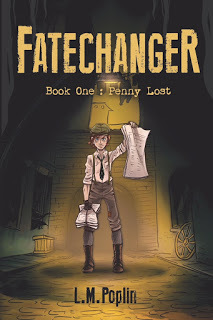
Fatechanger Book One: Penny Lost By L. M. Poplin
The 9 Questions
What message are you hoping people will receive when they read your book?
When writing Fatechanger, I tried to concentrate first and foremost on telling a good story about a compelling character, but I’d be lying if I didn’t admit to incorporating a few themes into Penn’s story. I believe deeply, for example, in the dignity of all people. We all have infinite worth, even if some of us (like Penn) don’t recognize it. I hope anyone reading my book will realize that they have inherent value. Another theme, which is related to the first one, has to do with equality. If we all have inherent worth, we should all have equal rights. Penn has to fight to be accepted despite her gender, her social class, and her disability. These fights are important and valid, but in a perfect world, she wouldn’t have to fight at all.
Why did you write this book?
I wrote Fatechanger because I have never felt like I belonged. Wherever I go, I’m the one who doesn’t fit in. For years, thanks to Laura Ingalls Wilder and L. M. Montgomery, I used to dream about living in a different time period. Then my family hosted an exchange student from Germany and I was convinced that my displacement was geographical. Twenty-six residences, four countries, and five states later, I realized that the problem was with me and my inability to accept myself for who I am rather than who society tells me I should be. While it’s true that I still feel like I don’t belong, writing Fatechanger has helped me realize that I don’t need to.
What has been the hardest part of the publishing process?
Self-doubt. I made the mistake of querying my manuscript too early. Then I compounded my mistake by taking the rejections too seriously—as a judgment of my identity as a writer and my skill with words rather than the state of my manuscript. Fortunately, I have a patient, loving, and talented writer friends who repeatedly told me what I needed to hear until I was willing to hear it. And then they helped me through the revision process.
What has been the biggest (pleasant) surprise in your publishing journey?
Actually, my biggest pleasant surprise is related to my biggest unpleasant surprise. I was (and continue to be) shocked by how many people are unwilling to help a fellow writer. As someone who tries to live by the golden rule, I’m often disappointed when others don’t choose to reciprocate. That said, there are so many wonderful, generous, helpful, seriously talented people who choose to celebrate and support their peers—who feel an obligation to share their own good fortune. I’m forever grateful to all the brilliant writers who have helped me along my journey, and I hope to pass along their generosity and wisdom. Publishing is not a zero-sum game. Every good book is a win for us all.
Give some advice to someone who wants to get a book published.
Never give up. I used to think that a trite phrase. And a false one. But I really do believe that what separates the published authors from the not-published-yet authors is a good dose of humility and a larger dose of determination. My senior year in high school, I was in a remedial English class, where desk chairs were hung daily from the metal lattice framework that supported the office tile ceiling. I can’t remember reading a single book the entire year. Now, I’m an assistant professor teaching writing and literature at Berklee College of Music. So many of my students believe they’re bad writers because of something someone else told them (often their high school English teacher). Don’t listen to them! Writing is hard work, yes, but everyone has a story to tell, and their own voice to tell it in. The trick is not to give up until you find it.
What’s the worst advice you have ever received about publishing?
For the longest time, I believed there was only one path to publishing. Luckily, teaching at Berklee College of Music (where independent music is not only accepted but revered) has shown me the error of my thinking. Perhaps because publishing—especially print publishing—is a much older industry than either the film or music industry, it has taken longer for the publishing world to welcome the inclusion of independent and diverse voices. But technological advances and a growing awareness of our need to hear all voices have opened the publishing industry to many new and exciting opportunities for writers.
What author or book has influenced your writing?
So many!! Fatechanger was probably influenced most by Tamora Pierce’s writing, specifically The Song of the Lioness quartet. Although Fatechanger is a time-travel novel set in 1915 Boston (more historical than fantasy), I was devouring as many YA fantasy novels as possible while working on the manuscript. Leigh Bardugo’s Six of Crows duology and Sara J. Maas’s Throne of Glass series were also very inspiring.
What is your philosophy about rejection?
There are different types of rejection. The rejection from the agent who was feeling sick while reading your query on a crowded train next to the person with bad body odor is different than the rejection from the editor who considered deeply your character’s motivation and found it lacking. One type of rejection you can learn from. The other type of rejection is simply a result of chance, and things might have gone differently on another day. For way too long, I treated all rejections equally, and my ego was severely bruised without anything positive to show for it. Now I try to use my energies better, to filter out the rejections that can teach me about myself and my writing.
You are stranded on an island with only 3 books. What are their titles?
The Lord of the Rings by J. R. R. TolkienThe Little Prince by Antoine de Saint-ExupéryThe Complete Works of William Shakespeare (Okay, so maybe this is a cheat, but “stranded” implies a long, long time.
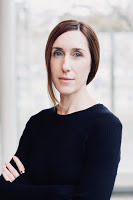
Author website: https://www.lmpoplin.com/
Goodreads: https://www.goodreads.com/author/show/18945312.L_M_Poplin?from_search=true
Amazon author page: https://www.amazon.com/L.M.-Poplin/e/B07RQMQ5FZ/ref=dp_byline_cont_book_1
Twitter: https://twitter.com/lmpoplin1
Instagram: https://www.instagram.com/lmpoplin1/
Facebook: https://www.facebook.com/laura.mccunepoplin
LinkedIn: https://www.linkedin.com/in/laura-mccune-poplin-4b43a34
July 19, 2019
9 Questions With Joseph Carrabis

This week's featured author is Joseph Carrabis from Nashua, NH and his sci-fi thriller The Augmented Man.

The Augmented ManBy Joseph Carrabis
1. What message are you hoping people will receive when they read your book?
I’m hoping people will receive the message “Buy all of Joseph Carrabis’ books.” Beyond that? That people can heal and healing requires effort. People have to make a decision to get well and then make getting well more important than air, food, and water. You can’t be free of your past unless you’re willing to embrace it. Embrace it, acknowledge it, accept it, then you can move on from it.2. Why did you write this book?
The concept is a simple one, and I’m surprised by people’s reactions to it; the majority of first and ARC readers tell me it’s fascinating, powerfully disturbing, well written (I hope so! After all the editing we did?), and innovative beyond imagination. That noted, I wrote it simply because I could, because I lived through most if not all of it - I always tell people my work is autobiographical. All authors write an autobiography, some admit to it - because (I hope) it explains to those in the kinds of pain described a way out (I’ve been told the middle section reads like a psychotherapeutic case study).
3. What has been the hardest part of the publishing process?
Patience. I wrote the story in the early 1990s.
4. What has been the biggest (pleasant) surprise in your publishing journey?
Hmm...probably realizing I really can write, really can tell a good story.
5. Give some advice to someone who wants to get a book published.
First, if you want to be published in today’s world and are not published, you simply don’t want to be published. People can self-publish and most do (unfortunately, me thinks (and I self-pubbed two books, although not for the reasons most people go that route)). There are also lots of “indie” publishers which are just people in the basement wanting to look impressive - be careful. Remember, it’s your work, not theirs (I had one publisher threaten me during a video call if I didn’t give him the book. Fascinating experience). Also, I know a fellow who’s “still deciding” whether or not to self-publish or seek a publisher after some thirty years. His real problem is that his work sucks; sucked back then and sucks now. I suspect he knows it and that has more to do with his not deciding than anything else. Perhaps he’s afraid to find out the truth? But that’s another thing that’s necessary: Be willing to be uncomfortable. The only way I’d learn if I could really tell a story worth reading was by sending it out, again and again and again. In the early 1990s, nobody was interested. The publishing world changed. This time I had several offers (hence patience). If you want your work to be published, be willing to have your work rejected. Note the emphasis. People’s likes and dislikes are always subjective. Editors and publishers may know what’s selling and have an idea of what will sell, your work may be a perfect fit, but they don’t like your protagonist so they reject your work. Their loss, not yours. Move on.
6. What’s the worst advice you have ever received about publishing?
“You’ll be sorry if you don’t let us publish this book.” Another gem was “It doesn’t matter how you wrote it, we’re going to change all your colons and semicolons into emdashes.” A basic rule I have is “If the information isn’t geared towards making the work better, it’s worthless.” This is based on the axiom “Criticism without suggestion is worthless.” My suggestion regarding any advice - good or bad - is “Thank them first, then decide if the advice gets you closer to your goal. If yes, act on it. If no, move on.”
7. What author or book has influenced your writing?
How long a list would you like? AJ Budrys, Katherine Mansfield, Wells, Doc Smith, Homer, Lucien, The Grimm Brothers (original stories), Virginia Woolfe, Poe, Shelley, Dick, Wouk, ... ancients through the 1960s, from all cultures. Craig Johnson’s Longmire series until the last one (“Winter” something. He was writing literal poetry until that one. No idea what happened), Leonard, and we haven’t even gotten to the poets. Oy, the poets! Dickey, Giovanni, Hall, ... Western (culture) genre writing tends to peter out once you get into the 2000s.
8. What is your philosophy about rejection?
Move on. If there are suggestions, decide if they move you closer to your goal. If yes, act on them. If no, move on.
9. You are stranded on an island with only 3 books. What are their titles?
The complete annotated ShakespeareThe complete, annotated Upanishads The complete, annotated Histories of World Civilizations
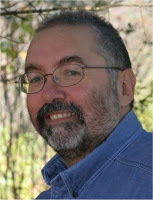
http://nlb.pub/Twitter http://nlb.pub/Facebook http://nlb.pub/LInkedIn http://nlb.pub/GoodReads http://nlb.pub/Pinterest http://nlb.pub/Instagram http://nlb.pub/amazon



